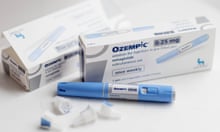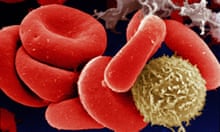 For those who survive a heart attack, the risk of another one is highest in the first year. Photograph: DecaStock/Alamy –
For those who survive a heart attack, the risk of another one is highest in the first year. Photograph: DecaStock/Alamy –
–
Andrew Gregory Health editor
Cardiovascular disease is the most common cause of death worldwide, with heart attacks the most common acute event. For those who survive an attack, the risk of another one is highest in the first year because blood vessels are more sensitive, making it easier for blood clots to develop.
Researchers at Imperial College London and Lund University in Sweden found that by giving heart attack patients two drugs together – statins and ezetimibe, a cholesterol-lowering drug – their risk of another heart attack, stroke or death was reduced.
“This study shows that we could save lives and reduce further heart attacks by giving patients a combination of two low-cost drugs,” said Prof Kausik Ray, of Imperial’s School of Public Health.
“But at the moment patients across the world aren’t receiving these drugs together. That is causing unnecessary and avoidable heart attacks and deaths – and also places unnecessary costs on healthcare systems.
“Our study shows the way forward. Care pathways must now change for patients after this type of heart event.”
Researchers analyzed patient data to measure the potential impact of the dual combination of drugs.
They compared patients who received statins and ezetimibe within 12 weeks of a heart attack, those who were given statins with ezetimibe added between 13 weeks and 16 months, and others who got just statins with no ezetimibe at all.
Data from 36,000 Swedish patients who had a heart attack between 2015 and 2022 was analyzed, and advanced statistical models were used to emulate a clinical trial.
Those who received statins and ezetimibe within 12 weeks of a heart attack and were able to lower cholesterol to the target level early had a better prognosis and less risk of new cardiovascular events and death than those who received the add-on treatment later, or not at all, according to the study.
“Our findings suggest that a simple change in treatment guidelines could have a huge impact on patients,” said Ray.
“Ezetimibe is already widely available and prescribed for relatively low cost. This add-on therapy could be rolled out for around £350 a year per patient, which is a huge cost saving compared to the lasting impacts of treating heart attacks and the impact they have on patients’ lives.”
[For the balance of this very important, and potentially life-saving article, please visit: https://www.theguardian.com/science/2025/apr/14/combination-cheap-drugs-statins-ezetimibe-could-save-lives-after-heart-attack-study-finds]
–
Explore more on these topics
Related stories
















